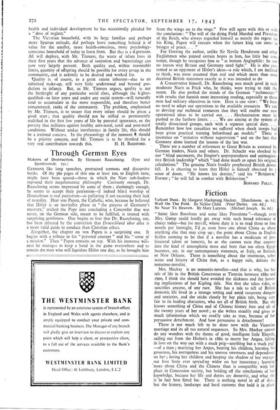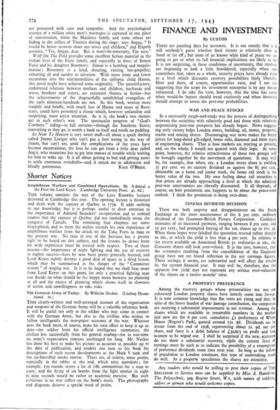Fiction
So Near To Heaven. By Mary Lutyens. (Michael Joseph. 8s. 6d.)
" Soho likes Rooshans and some likes Prooshans "—though even Mrs. Gamp could hardly get away with such broad tolerance of choice today—but for myself, whose duty it is to read three or four novels per fortnight, I'd ,,as soon have one about China as about anything else that may crop up ; the point about China in English fictlbn seeming to be that if a novelist has a modicum of pro- fessional talent or honesty, he or she cannot turn that country into the kind of atmospheric mess and bore that too often Egypt becomes, say, in our contemporary romances, or Italy, or Ireland, or New Orleans. There is something about the enormous, sober scene and history of China that, as a happy rule, defeats the nonsense-novelist.
Mrs. Mackay is no nonsense-novelist—and that is why, for her tale of life in the British Concession at Tientsin between 188o and 19oo, I think she should have avoided the slickness and the hover- ing implications of her Kipling title. Not that she takes sides, or sanctifies anyone, of any race. She has a tale to tell of British domestic life lived in a strange setting and amid recurrent dangers and anxieties, and she sticks closely by her plain tale, being very fair to its leading characters, who are all of British birth. But she knows something of China and of Chinese history fore and aft of the twenty years of her novel ; so she writes steadily and gives us much information which we readily take as true, because of her persuasive detachment. And how persuasive is detachment!
There is not much left - to be done now with the Victorian marriage and its all too natural sequences. So Mrs. Mackay cannot do any wonders with the theme of good, intelligent little Elspeth, sailing out from the Hielan's in 188o to marry her Angus, falling in love on the way out with a stuck prig—anything but a stuck pig! —of a man ; marrying her Angus, bearing his children, learning his grossness, his averageness and his uneven sweetness and dependenc.: on her ; loving her children and keeping the shadow of her voyage- out love from ever spreading wider on her innocence ; learning more about China and the Chinese than is compatible with her place in Concession society, but holding off the conclusions of her knowledge, because her life and duties are domestic, and what she is "In fact best fitted for. There is nothing novel in all of this , but the history, landscape and local customs that hold it in place
are presented with care and sympathy. And the psychological essence of a million white men's marriages is captured in one piece of conversation, when the Maclaren family and some others are hiding in the cellars of Tientsin during the siege: says Angus, " It would be better to-to-to shoot our wives and children," and Elspeth answers, " Yes, Angus, dear. But it won't-be-necessary, I'm sure."
Wolf On The Fold provides some excellent fiction material in the violent lives of the Furie family, and especially in those of Simon Furie and his daughter Rosemary. Simon is a humbug and megalo- maniac ; Rosemary is a kind, shouting, ranting hot-gospeller, exhorting all and sundry to salvation. With more irony and fewer excursions into the sentimentalities of the epileptic child Hanna, this novel might have achieved some originality. The unsatisfactory, embittered relations between mothers and children, husbands and wives, brothers and sisters, are recurrent themes in fiction—but the achievements of the disgracefully uninhibited evangelists of the early nineteen-hundreds are not. So this book, written more toughly and briefly, with much less of Hanna and more of Rose- mary, could have presented a theme which, however unfamiliar and surprising, must arrest attention. As it is, the book's two themes get in each other's way. The spectacular progress of " God's Cowboys " riding—in full costume—through the Southern States, converting as they go, is worth a book to itself and needs no padding.
So Near To Heaven is very sweet stuff—all about a spoilt darling called Jimmy Lorigni who can't put a foot wrong in the way of charm, but can't see, until the complications of the years have become mountainous, the love he can get from a little dear called Angie, who meantime has to get into masses of trouble while waiting for him to wake up. It is all about getting to bed and getting aunts to settle enormous overdrafts—and it struck me as adolescent and



























 Previous page
Previous page